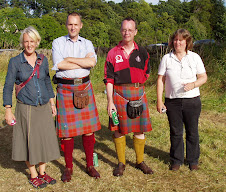Another day,
almost too droopy to record. I got around the garden with Helen. The Sydenham
Mileses will be here tomorrow, their entertainment to consist (at best) of
walking round the garden.
So, here’s the
prodigal son.
I imagine myself
in the story, set on our 20 acres in Perthshire. I have been working in
the raspberry field. When the light begins to fail, I pack up and head home, up
past the plantation and along the stubble field. From there I can see the
house, all lit up, and hear the cheerful noise. It isn’t hard to guess what has
happened. Nigel has come back. Couldn’t a servant have been dispatched to tell
me? I trust at least they haven’t killed my dear calf.
Nigel went off
with half of his inheritance. It crosses my mind that he is now going to make
serious inroads on the other half.
Our father was watching
the road, and saw Nigel from a distance. But he doesn’t seem to expect me, home
from work at the usual time. I have to send a servant for him. When I register
my complaint, he says I could have had anything I want at any time – a goat to
feast my friends. But that’s not the point. I want to be given something, out
of love, like Nigel: not just to take a goat for myself.
I don’t know what
I conclude from all this. But I think of St Theresa of Avila who said once, to
God – I think her carriage had gone into a ditch – “If this is the way You
treat Your friends, it’s no wonder You have so few.”



The father does tell his older son that everything he has now belongs to the older son. I think almost everything in this chapter is directed at the pharisees, who actively were trying to limit access to God. You can see Jesus' opinion of this when he talks to the disciples about limiting children's access to him, he was angry.
ReplyDeleteJane
I think the older son is like Martha - he wants justice, a reward for good behaviour - he doesn't value love since it seems God hands that out to everybody and anybody, even his no good brother. I have an older brother - justice reminds me of reasons why I should dislike him and love has a hard time getting a word in edgeways - so I know how the older brother in the parable feels.
ReplyDeleteAnne
As I am one of two sisters I understand the sibling rivalry part. What helped me - eventually - was the realization that parents treat us differently because we are, in fact, different. Not only the difference in character, but the differences in perspective of being the first vs, the second child. I think it would be helpful to the children involved if their parents gently pointed out this dynamic. Didn't Jesus also tell the story of the shepherd who rejoiced when recovering the one little lost lamb? Easier when it is animals. Chloe
ReplyDeleteof the shepherd
Yeah, I'm the oldest too, and there was a learning curve for me too.
DeleteI have five adult children. Three of them have stopped going to church and one goes to a totally different church. It hurts my heart. Not for this life, but for the next. The things of this life are nothing. What I want, more than anything else, is for us all to be together in the next life. That’s the most important thing for me.
ReplyDeleteI take comfort in the parable of the workers in the vineyard, who received a whole day's pay even when they had only just begun. So we who have faith spend our life in the security of the vineyard knowing we will be 'paid', and I hope that those who meet Christ only after their last breath will nevertheless accept his offer and receive their 'pay', even though they have only spent a microsecond in the security of the vineyard. Anyway, that's what I hoe that parable means.
DeleteKirsten, that is a wonderful thought and one I shall remind myself of regularly. I think you are right about the meaning of the parable. I try to keep in mind, that the things we leave this life with are our knowledge and our love.
DeleteThere are several occasions when people who were already dead as far as everyone thought heard Jesus...
ReplyDelete